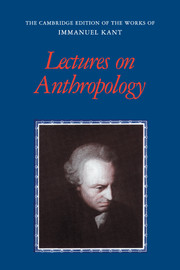Book contents
- Frontmatter
- Contents
- General editors’ preface
- Preface
- Abbreviations
- General introduction
- Anthropology Collins 1772–1773
- Anthropology Parow 1772–1773
- Translator's introduction
- Lecture of the Winter Semester 1772–1773 based on the transcriptions of Parow, Euchel, Brauer, Hamilton, Philippi, Collins and Dohna
- Anthropology Friedländer 1775–1776
- Anthropology Pillau 1777–1778
- Menschenkunde (1781–1782?)
- Anthropology Mrongovius (1784–1785)
- Anthropology Busolt, 1788–1789
- Editorial notes
- Glossary
- Bibliography
- Index
Lecture of the Winter Semester 1772–1773 based on the transcriptions of Parow, Euchel, Brauer, Hamilton, Philippi, Collins and Dohna
[Excerpts]
Published online by Cambridge University Press: 05 April 2013
- Frontmatter
- Contents
- General editors’ preface
- Preface
- Abbreviations
- General introduction
- Anthropology Collins 1772–1773
- Anthropology Parow 1772–1773
- Translator's introduction
- Lecture of the Winter Semester 1772–1773 based on the transcriptions of Parow, Euchel, Brauer, Hamilton, Philippi, Collins and Dohna
- Anthropology Friedländer 1775–1776
- Anthropology Pillau 1777–1778
- Menschenkunde (1781–1782?)
- Anthropology Mrongovius (1784–1785)
- Anthropology Busolt, 1788–1789
- Editorial notes
- Glossary
- Bibliography
- Index
Summary
LECTURES ON ANTHROPOLOGY
Empirical psychology is a species of natural doctrine. It treats of the appearances of our soul that constitute an object of our inner sense, and indeed just as the empirical natural doctrine, or physics, treats appearances. One also sees how little this doctrine can constitute a part of metaphysics, since the latter has solely conceptus puri or concepts which are either given through reason or yet at least whose ground of cognition lies in reason, as its theme. This error derives merely from this, in part because the ancients had collected only a few experiences of the soul, in part because they did not know where they should make room for this doctrine, since they held the whole of metaphysics for an expanded psychology, because the soul is an object of inner sense; but from the soul arise all the concepts of the understanding. But now since we already have obtained a whole collection of this source of human actions or many kinds of appearances of the soul, especially through the English writers, we can expound this doctrine just as we do physics. It is to be wondered at that the ancients did not occupy themselves more with human cognition, even though they declared this endeavor to be the most useful one. But there is nothing more usual than that one believes himself to know that with which one is accustomed to deal, and holds it to be not worthy of his investigation. This opinion, which is implanted in us, has done uncommon harm to the sciences, and deprived us of the cognition of many things. At the same time, it is to be remarked that because the sciences are expounded in academies in a certain order and separate from other sciences, they have grown and expanded greatly. It is precisely so with empirical psychology, 25:244for as long as it was dependent on metaphysics, and was not expounded especially, it had only a very small range. It even deserves a special set of lectures, in part because it does not at all belong in metaphysics, in part because it can be learned by everyone without requiring any prerequisite sciences. Here one can learn about the source of all human actions and the character of human beings, which one otherwise finds scattered now and again in the sciences, in novels and in some treatises on morality.
- Type
- Chapter
- Information
- Lectures on Anthropology , pp. 31 - 36Publisher: Cambridge University PressPrint publication year: 2012

